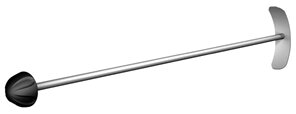
Metrichecking identifies cows with endometritis (uterine infection). Identification of these animals allows for treatment before the commencement of mating in order to improve the reproductive performance of the herd which means an extra 14 – 20 days in milk per cow treated the next lactation.
Symptoms.
Metrichecking is a veterinary procedure that identifies cows with endometritis.
Endometritis is a bacterial infection of the uterus that can occur following an abnormal calving or calving related disease process.
The Process.
A rubber scoop attached to a steel rod (Metrichecker) is carefully inserted into the vagina and scoops discharge. Cows with endometritis may have an abnormal discharge. In some cases it may be necessary to manually examine the cow’s uterus in addition to using the Metrichecking device.
Early Identification.
Early identification of endometritis allows for treatment before the commencement of mating which will give the infected cows the best chance of getting back in calf sooner.
Successful treatment of endometritis can mean as much as an extra 14 – 20 days in milk per cow treated the next lactation.
At-Risk Cows.
The current recommendation is to check all at-risk cows as early as possible. Cows can be Metrichecked and treated in weekly batches (by a veterinarian) as early as a week after calving. The following cows are at risk of having endometritis:
Metrichecking can be done early in weekly batches (by a vet) or the whole herd can be checked at least three weeks prior to the planned start of mating (by a vet or a vet technician). Positive cows can be drafted and treated. Treatments are always done by a veterinarian.
Even if you check the at-risk cows early, we still recommend whole herd pre-mating Metrichecking to detect any cows that have either been missed or have not responded to early treatments.
What are the potential effects of untreated endometritis?
New Zealand research has shown that cows with untreated endometritis have:
Appropriate treatment can result in very significant cost benefits through:
In an environment when we need to focus on high submission and conception, shorter mating periods, and lower empty rates we cannot afford to miss infected cows.